How That Special Bond Benefits Both of Them
Children and Dogs By Bradley Aron |Published 05-20-2020
The history of the friendship between man and domesticated animals goes back to tens of thousands of years ago. Nowadays, almost every family has a pet, and these animals are considered to be family members.
For children, growing up with and around pets, especially dogs, can be exceedingly beneficial for their growth, mentally, emotionally, and physically. And in similar ways, your child can help with the healthy growth of the animal. So, how does children and dogs benefit each other?
Children and Dogs: What Makes The Bond So Special?
Here are 21 benefits that children can gain as a result of growing up side-by-side with a dog.
1. Emotional healing
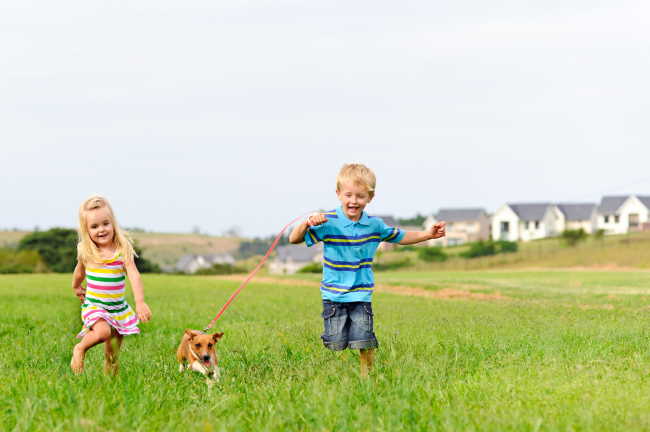 Children and Dogs: Emotional Healing
Children and Dogs: Emotional HealingChildren of anxiety and stress can find their emotional healing from dogs. These pets offer unconditional love, a dependable friendship that can help to lower the child’s blood pressure and reduce anxiety.
Scientists have been able to document this in autistic children and those that experience PTSD. Playing with or petting dogs also helps the animal to feel appreciated.
2. Dependable friendship
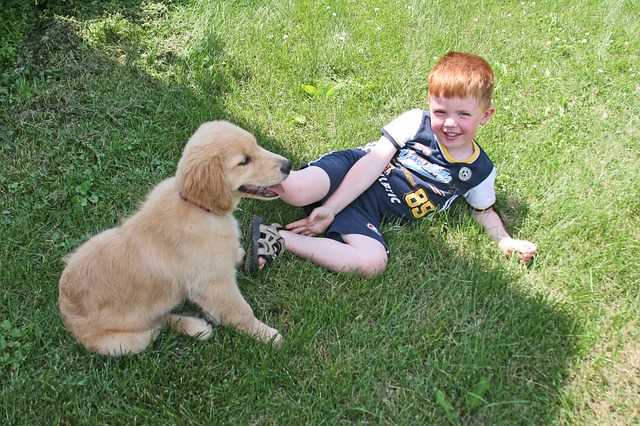 Children and Dogs: Dependable Friendship
Children and Dogs: Dependable FriendshipDogs don’t judge, nor do they discriminate or criticize. That’s the kind of friendship that a child needs. Further, aside from just functioning like dolls, dogs can feel and respond with nonverbal signs such as tail wagging or sounds. The relationship is real, and your child can count on this companionship every day of their lives.
Dogs are especially beneficial to lonely children or those in an environment of sibling rivalry. And for dog owners that are too busy, a child can fill in the role and give your pet the attention it wants.
3. Your child gets a buddy who hears their problems
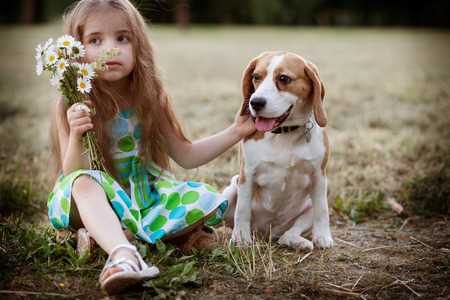 Your child gets a buddy who hears their problems
Your child gets a buddy who hears their problemsWhen negative emotions build up in your child, they can drive them to fitful behaviors such as bullying others or withdrawal that negatively affects their growth. A pet such as a puppy can help them deal with their emotions and let it out. These animals, for your baby, are ‘someone’ to talk to.
Dogs reduce tantrums, thumb-sucking, and aggressive off-track behavior that could otherwise negatively impact their development. On the other hand, babies reduce bad behavior in dogs such as barking and chewing.
4. Both learn empathy
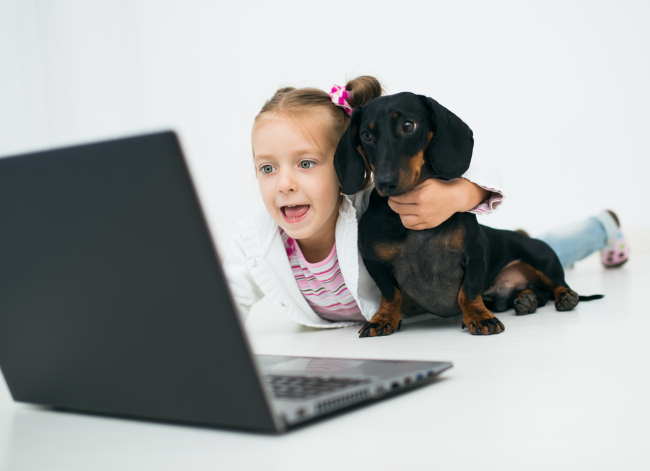 Children and Dogs both learn empathy
Children and Dogs both learn empathyAs your child grows up, they will learn that they have a role to make sure that their dogs are taken care of. That includes feeding them, playing with them, or holding and comforting them. These are all fundamental to the emotional development of the child.
That ability to care for pets is transferable to people and can remain with them for a lifetime. For the pet, the time they spend with your child will teach them to be people-friendly.
5. They both grow up with confidence
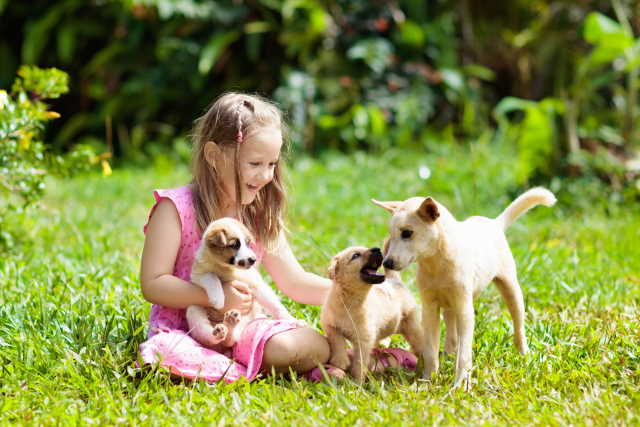 Children and dogs both grow up with confidence
Children and dogs both grow up with confidenceChildren that grow up with dogs develop faster. That is because even from a tender age, the child learns how to do simple tasks such as giving the pet water and food. As they grow a little older, they graduate to grooming them, walking them, and even training them.
Compared to a child that grows up without a dog in the family, your child will be a better leader with a natural enthusiasm to serve and ‘take care of things. As a result of the constant watching and training from your child, your dog can also learn responsible behaviors.
6. Dogs are crucial for language and social development
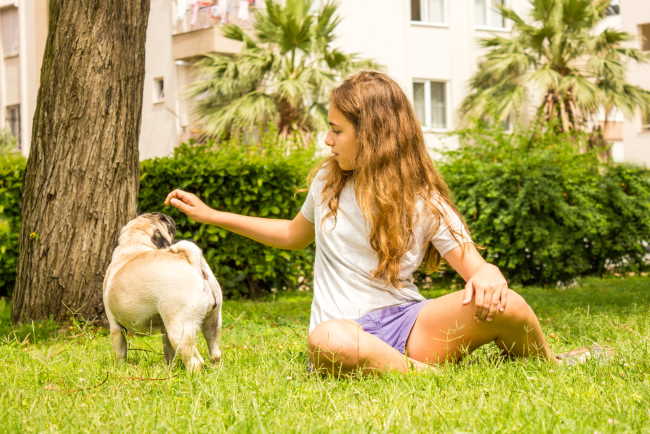 Dogs are crucial for language and social development
Dogs are crucial for language and social developmentBoth boys and girls love live animals more than toys. Dogs can be an essential learning focal point in the house. New studies show that dogs are increasingly and successfully being used in speech therapy sessions.
The daily interactions between your child and the dog can help them learn to speak faster. Your child also grows socially, which is critical, especially if they are an only child with no one else around.
7. They help each other to keep fit
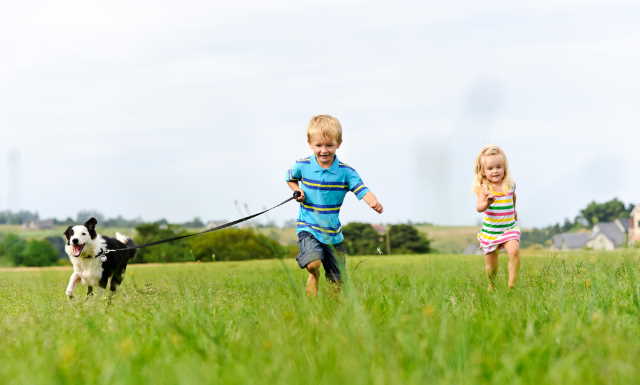 Children and Dogs help each other to stay fit.
Children and Dogs help each other to stay fit.Dogs are naturally not sedentary creatures. They are adrenaline-junkies. You might appreciate that, because your child will learn how to keep up with them and, as a result, keep fit.
The playtime, daily walks, and runs are all extremely beneficial to the health of both your baby and the animals.
8. Reduced hospital visits
 Dogs and Children: One study found that dogs can reduce hospital visits.
Dogs and Children: One study found that dogs can reduce hospital visits.Dogs may have a direct impact on the immune system of your child. One study conducted by Finnish scientists shows that babies that grow up with dogs are less susceptible to colds and ear infections.
The study reveals that animal contact in the first few years of a child’s growth is essential and that it helps to improve resistance to respiratory illnesses.
The study which got published in Pediatrics confirms that having a pet for your baby reduces their chances of catching the common cold and ear infections by 44%.
9. They have fun together
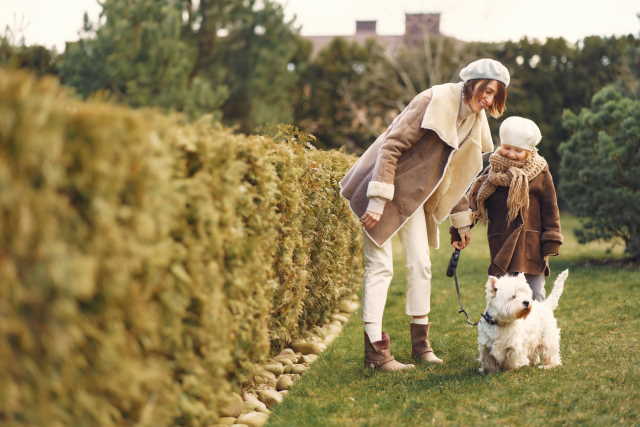 Children and Dogs have fun together
Children and Dogs have fun togetherBabies need to be happy, and dogs perform better than toys in that department. Dogs also need cheering to reduce boredom and destructive behavior. From the very first time, babies and dogs form a healthy and fun relationship.
Playing with the animal boosts their mood by activating the release of feel-good hormones. And happier children lead to happier parents. You get to focus on your tasks, knowing that your child is safe and having fun and that your dog is not chewing your upholstery.
Always supervise young children around dogs.
10. They can help each other be less lonely
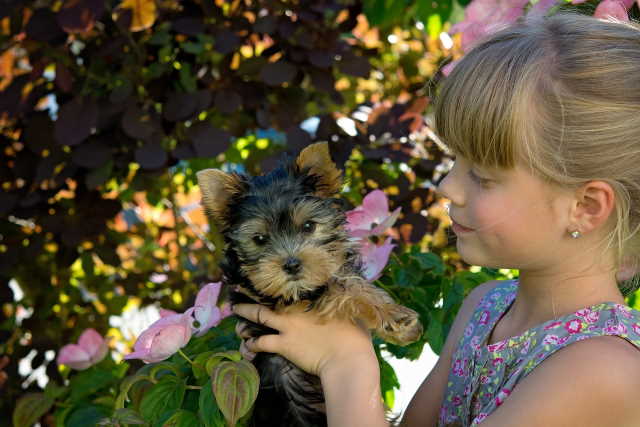 Dogs and Children can help each other be less lonely
Dogs and Children can help each other be less lonelyYou might have given your child all your attention when they were babies, but as they get a little older, you became busier and they become more independent. If it’s an only child, that means spending most of their time alone or watching too much TV. But when you bring in a dog, it’s like you have given them a sibling or a friend that never leaves. Dogs are intuitive creatures, playful, and entertaining.
They can help to reduce loneliness and improve your child’s self-esteem. Your child’s company is also something that the pet will grow very fond and appreciative of.
11. Dogs provide physical protection
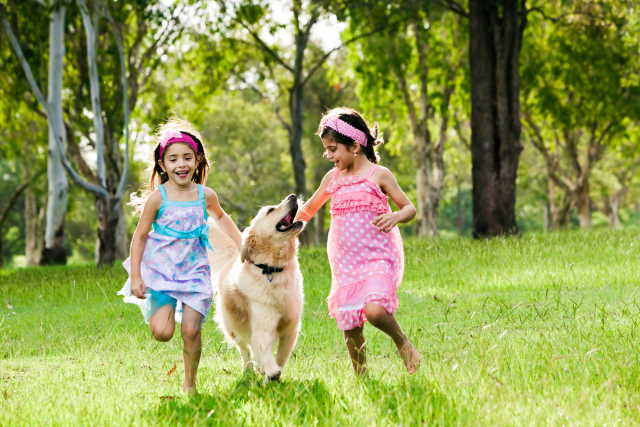 Dogs Provide Physical Protection
Dogs Provide Physical ProtectionDogs learn from what you do as a parent. These creatures are descendants of wolves, and for them, you are the leader of the pack. When they see you taking care of and protecting the child, they will do the same. Then again, dogs may interpret your child as a puppy.
Often you will see the dog sniffing and licking your child’s ear. That is what they do to their pups. You can bet that this animal will keep your child safe from danger in case of a robbery or accident.
Australian cattle dogs are herding dogs. Parents with such breeds of dogs report that these pets follow their children wherever they go, which improves confidence in their child’s safety. They may even try to herd “their” children.
German Shepherds, on the other hand, are often the top choice for police and military dogs. You can efficiently train these dogs to protect your child from all manner of danger.
12. Dogs and children are more sociable together
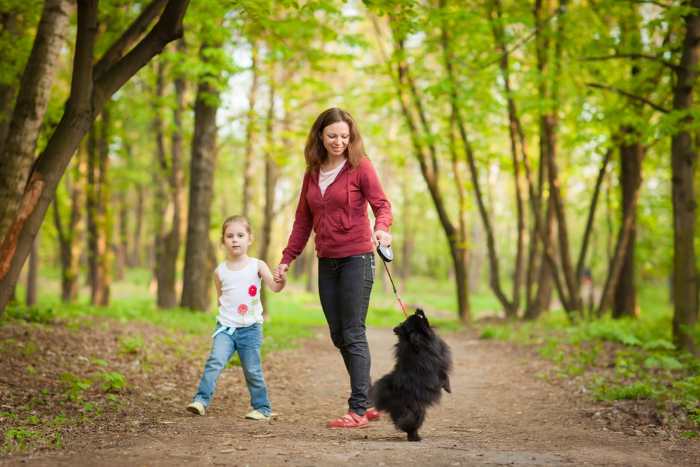 Dogs and children are more sociable together
Dogs and children are more sociable togetherDogs provide more than companionship for your child. They offer a reason for your child to step out of the house. And when they are out walking or playing with their dogs, these animals can act as ice breakers.
They help to start conversations with other kids, helping your child to make friends and get a social life. These outings will also be an opportunity for your dog to meet and play with neighborhood dogs.
When children are more social, their vocabulary improves and they learn from one another.
13. Dogs teach children how to cope with a loss
The life of a dog is short, with many of them never living past the 13-year mark. When they finally pass away, and your child copes with the situation, they will learn a crucial skill in life—bereavement.
That’s critical because life has many losses, and some of them hurt in unimaginable ways. When such events occur even later in life, your child will have the emotional strength to deal with it.
14. Children and Dogs Both learn respect
Dogs demand respect. They are not to be bothered when they are eating or sleeping. They are not to be forced to behave like humans or touched where they don’t want to be touched.
Dogs won’t like it when your child gets aggressive, bullying them, pulling their ears, or yelling at them. Children have similar demands and boundaries. When your child grows up with a dog, both of them will gradually learn these things.
15. Nothing is more loyal than a dog
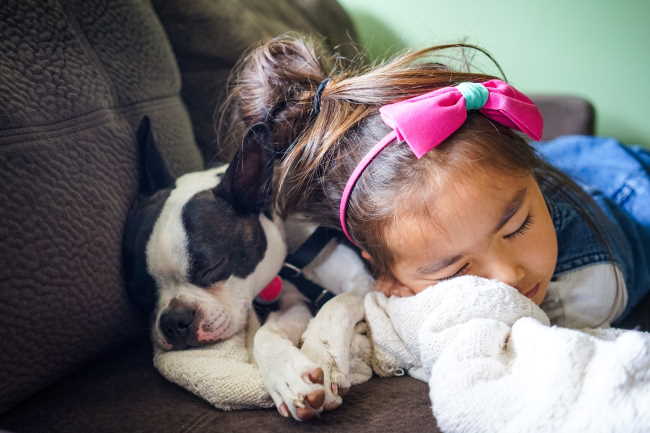 Photo by Leo Rivas on Unsplash
Photo by Leo Rivas on UnsplashDogs can follow you over a cliff. Love and loyalty come naturally for them, from their days as pack animals. These creatures live and breathe for the owner’s love.
They cry when you leave the house and jump for joy when you come back. They will want to follow you everywhere and do everything with you. Having a dog around can teach this great lesson to your child, that family is everything.
16. Patience and forgiveness
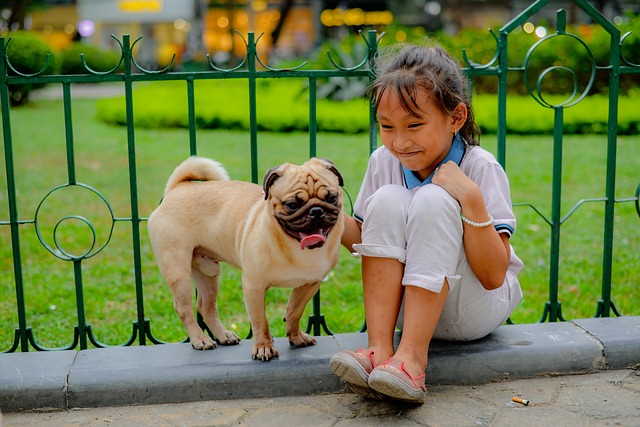 Dogs and Children: Children learn kindness, patience, and forgiveness from a dog
Dogs and Children: Children learn kindness, patience, and forgiveness from a dogIt takes time to bond with a dog successfully. When your child takes the time to understand the pet and their boundaries, that patience could find use in many aspects of their life as they grow.
And also, dogs don’t hold grudges. Whether your child hurts them knowingly or unknowingly, they will remain friendly the next time your child wants to play. Your child will probably learn to be kind to the animal as a result.
17. Dogs and kids think alike, and so they make good friends.
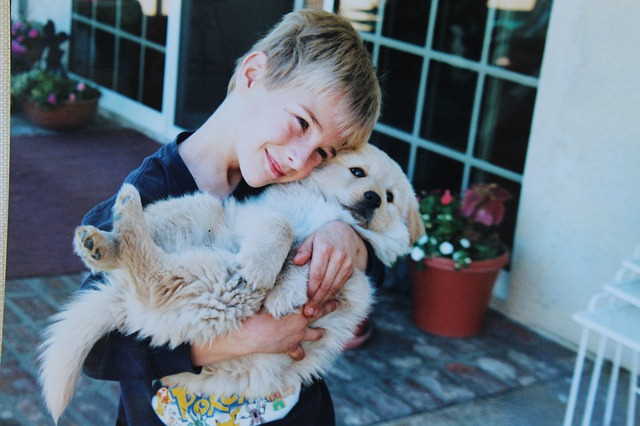 Dogs and kids think alike, and so they make good friends.
Dogs and kids think alike, and so they make good friends.Studies show that the mind of a child and that of a dog are almost identical. That means that when you have a family dog, your child will not feel bored or anything.
They will be actively engaged, continually learning, and exploring as though they are in school with other children. That learning and exploration is good for the child and helps to teach the dog some good behavior.
18. Dogs can turn your child into a fast thinker
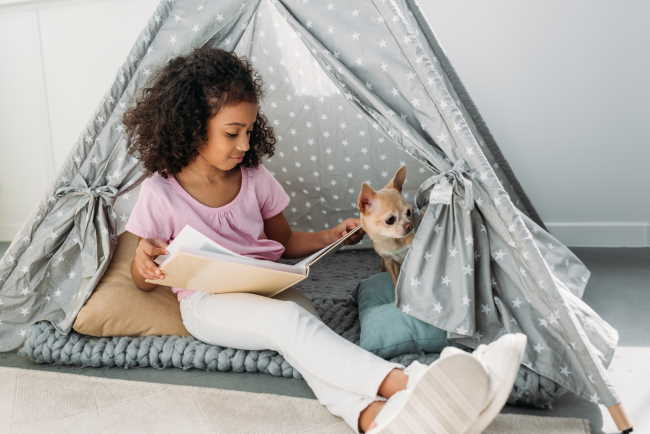 Dogs can turn your child into a fast thinker
Dogs can turn your child into a fast thinkerThis last point is a trickle down effect of all that has been laid out above. The cognitive ability of your child depends on their emotional wellness, physical health, fitness levels, social life, and personal responsibility, among others.
Because dogs help with all that, you may find that your pet-owning child performs better in school compared to other children with no dogs at home.
19. Some dogs can be trained to help with disability
 Some dogs can be trained to help with disability
Some dogs can be trained to help with disabilityService dogs are often trained to help your special needs child in various ways. These include physical support in movement, alerting caregivers in case of seizures in epileptic children. Having these pets in such cases improves the child sense of independence and confidence in social places.
20. Dogs can help a struggling reader
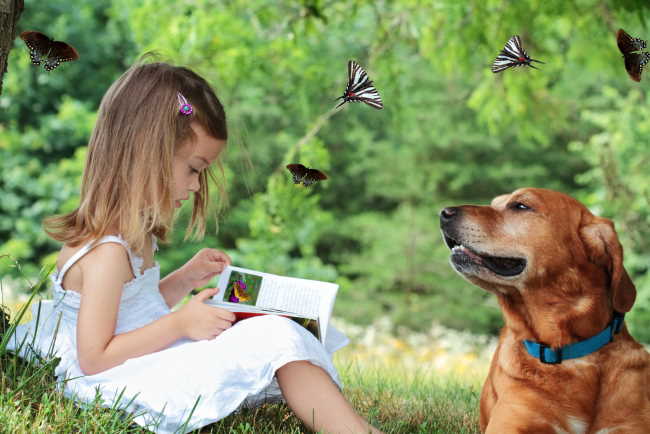 Dogs can help a struggling reader
Dogs can help a struggling readerDogs simply listen, they don’t comment. Children can read to their dogs and improve their fluency without constant correction or criticism. That could be motivating for the child to keep reading.
21. Dogs can teach children responsibility
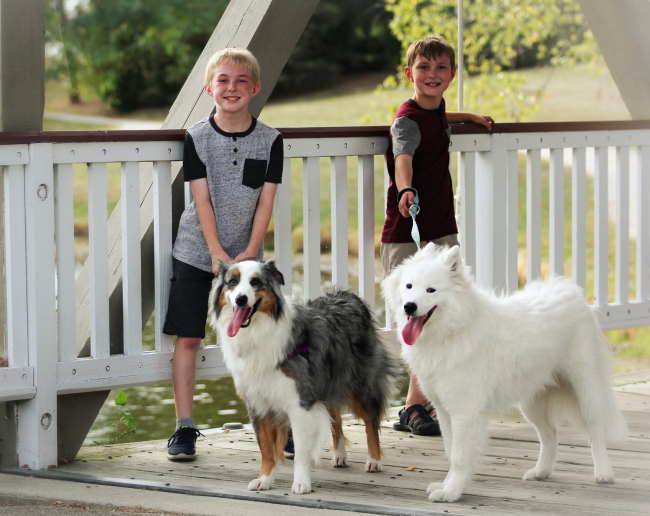 Photo by Sheri Hooley on Unsplash
Photo by Sheri Hooley on UnsplashBy feeding, grooming, or exercising the dog, your child will learn to be a responsible person. As they grow they start to understand obligations such as remembering the dog’s mealtimes, cleaning up the yard, and walking them.
Last Words About Children and Dogs
Dogs are special. They are more like us in behavior compared to all other animals. Having a dog around can make life easier for you and your child in many ways. In some ways, children and dogs are a match made in heaven.
Children and Dogs Pin for Future Reference
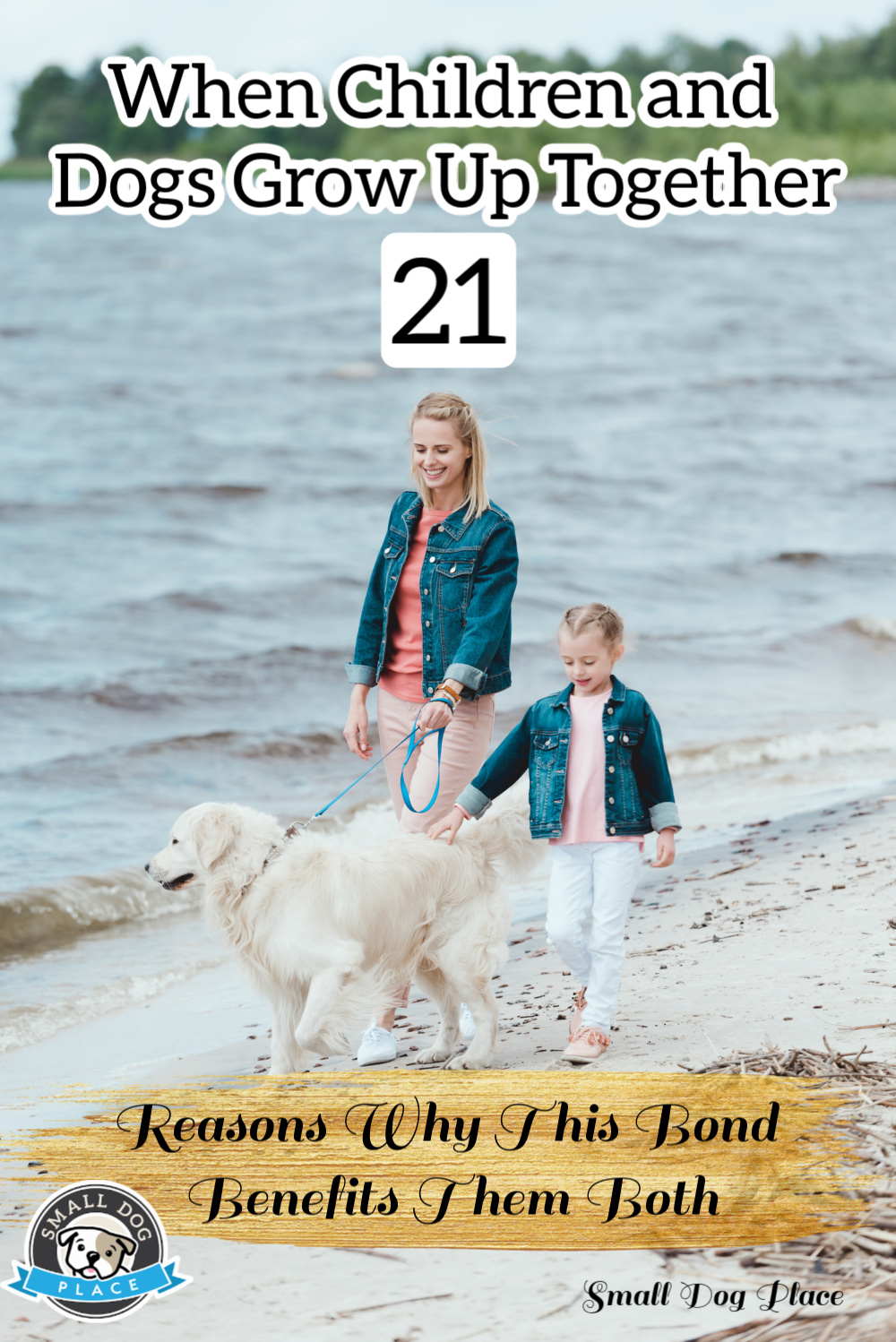 Children and Dogs: Pin for Future Reference
Children and Dogs: Pin for Future ReferenceAuthor Bio (Children and Dogs)
Bradley Aron is the
head of content for the EzCare clinic, a medical clinic that provides world-class health care services. He has
been associated with the health care industry for 10+ years and specializes in
health care and medical content.
Did You Find This Article about Children and Dogs Helpful? May we suggest…
Does This Article Deserve Your Thumbs Up?
We always appreciate your support and encouragement. Your thumbs up means so much to us.

Free Monthly Newsletter
Sign Up for Our Free Newsletter and get our Free Gift to You.
my E-book, The Top 10 Mistakes People Make When Choosing a Dog (and how to avoid them)
If you enjoyed this page, I’d love it if you’d let me know. Just click the button below. Thank you.
Sharing is Caring



